Comprehensive Guide to Garden Maintenance in Holborn
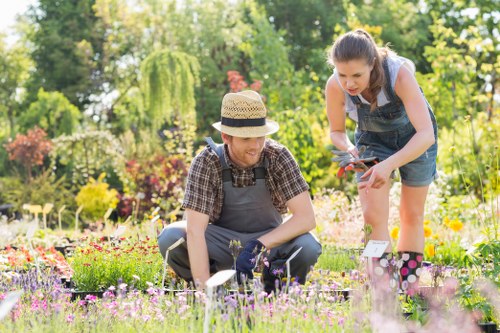
Maintaining a beautiful garden in Holborn requires dedication, knowledge, and the right set of tools. Whether you are a seasoned gardener or a novice, understanding the unique aspects of garden maintenance in this vibrant London borough can help you create a lush and thriving outdoor space.
Holborn's climate presents both opportunities and challenges for garden enthusiasts. The temperate weather allows for a variety of plants to flourish, but it's essential to tailor your garden maintenance practices to suit the local conditions.
Regular garden maintenance not only enhances the aesthetic appeal of your property but also contributes to the overall health of your plants. From pruning and weeding to soil management and pest control, every aspect plays a crucial role in sustaining a vibrant garden.
Importance of Regular Garden Maintenance
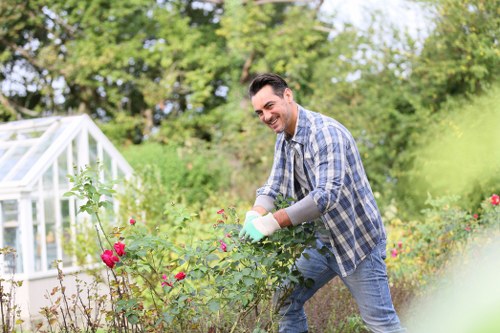
Consistent upkeep is key to ensuring that your garden remains healthy and attractive. Neglected gardens can quickly become overrun with weeds, pests, and diseases, making it difficult to restore their beauty and functionality.
Here are some reasons why regular garden maintenance is essential:
- Promotes Plant Health: Regular care helps plants grow stronger and resist diseases.
- Enhances Aesthetics: Well-maintained gardens are visually appealing and can increase property value.
- Prevents Pests and Diseases: Routine inspections and treatments can keep unwanted pests at bay.
- Environmental Benefits: A healthy garden contributes to better air quality and provides a habitat for local wildlife.
By investing time and effort into garden maintenance, you ensure a sustainable and enjoyable outdoor space for years to come.
Seasonal Garden Care Tips
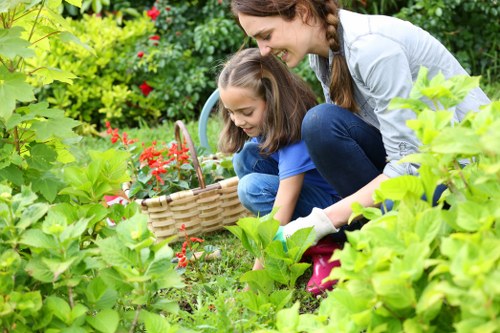
Spring Maintenance
Spring is a crucial time for garden maintenance in Holborn. As the weather warms up, it's essential to prepare your garden for the growing season.
Key spring tasks include:
- Pruning dead branches and shaping plants.
- Applying fertilizer to nourish the soil.
- Planting new flowers and vegetables.
- Clearing debris and preparing garden beds.
Proper spring care sets the foundation for a thriving garden throughout the year.
Summer Maintenance
During the summer months, the focus shifts to watering, weeding, and managing plant growth.
Summer garden tasks:
- Regularly water plants to prevent drought stress.
- Remove weeds to reduce competition for nutrients.
- Support tall plants and manage overgrowth.
- Monitor for pests and diseases, applying treatments as needed.
Keeping up with these tasks ensures that your garden remains vibrant and healthy even in the peak of summer.
Choosing the Right Plants for Holborn's Climate
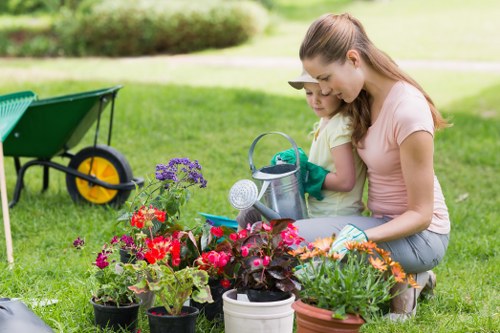
Selecting plants that are well-suited to Holborn's climate is fundamental for successful garden maintenance. Consider factors such as sunlight, soil type, and water availability when choosing your plants.
Popular plant choices in Holborn:
- Perennials: Reliable and long-lasting, perennials like lavender and hostas thrive in this region.
- Annuals: For seasonal color, annuals such as marigolds and petunias are excellent choices.
- Succulents: Low-maintenance and drought-resistant, succulents like aloe vera can add texture to your garden.
- Vegetables: If you have a vegetable garden, opt for varieties that are known to perform well in Holborn's climate.
By choosing the right plants, you reduce the need for excessive maintenance and ensure a more resilient garden.
Professional Garden Maintenance Services in Holborn
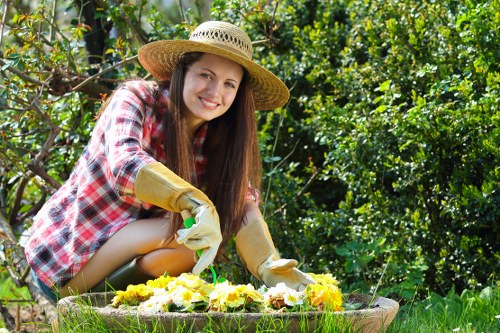
For those who prefer to leave the hard work to the experts, professional garden maintenance services in Holborn offer a range of solutions tailored to your needs.
Benefits of hiring professionals:
- Expert knowledge of local plant species and climate.
- Access to specialized tools and equipment.
- Time-saving, allowing you to enjoy your garden without the hassle.
- Customized maintenance plans to suit your specific garden requirements.
Whether you need regular upkeep or a one-time service, professional gardeners can help maintain the beauty and health of your outdoor space.
Customized Maintenance Plans
Professional services often offer customized plans that address the unique needs of your garden. This can include scheduled watering, fertilization, pruning, and pest control, ensuring that your garden remains in optimal condition year-round.
Experienced Gardeners
Experienced garden maintenance professionals bring a wealth of knowledge and skills to manage various garden challenges. Their expertise can help you achieve the garden of your dreams with minimal effort on your part.
DIY Garden Maintenance: Tips and Tricks

If you prefer to maintain your garden yourself, there are several tips and tricks that can simplify the process and enhance your results.
DIY garden maintenance tips:
- Plan your garden layout: Organize your plants based on their sunlight and water requirements.
- Use quality soil: Invest in high-quality soil to provide a healthy foundation for your plants.
- Mulch effectively: Mulching helps retain moisture, suppress weeds, and regulate soil temperature.
- Regular pruning: Keep your plants in shape and remove any dead or diseased branches.
- Stay consistent: Establish a regular maintenance schedule to ensure all tasks are performed timely.
Implementing these practices can make DIY garden maintenance more manageable and enjoyable.
Essential Tools for DIY Gardeners
Having the right tools is essential for efficient garden maintenance. Equip your garden shed with the following:
- Pruning shears and loppers
- Garden gloves
- Watering cans or hoses
- Weeders and hand tools
- Wheelbarrow or garden cart
Quality tools not only make maintenance tasks easier but also help achieve better results.
Time Management Strategies
Balancing garden maintenance with other responsibilities can be challenging. Here are some strategies to manage your time effectively:
- Create a maintenance schedule and stick to it.
- Delegate tasks where possible, involving family members.
- Prioritize tasks based on urgency and importance.
- Use efficient gardening techniques to save time.
With these strategies, you can maintain a beautiful garden without feeling overwhelmed.
Sustainable Gardening Practices

Sustainability in gardening not only benefits the environment but also enhances the resilience of your garden. Implementing eco-friendly practices can lead to a healthier and more sustainable outdoor space.
Key sustainable practices:
- Composting: Recycle garden waste and kitchen scraps to create rich compost for your soil.
- Rainwater harvesting: Collect rainwater to use for watering your plants, reducing reliance on mains water.
- Organic fertilizers: Use natural fertilizers to nourish your plants without harming the environment.
- Native plants: Incorporate native species that are well-adapted to the local climate and require less maintenance.
Adopting these sustainable practices can make your garden more eco-friendly and easier to maintain.
Reducing Chemical Usage
Minimizing the use of chemical fertilizers and pesticides is crucial for maintaining a healthy garden ecosystem. Opt for natural alternatives and integrated pest management techniques to control pests and diseases.
Benefits of reducing chemicals:
- Protects beneficial insects and wildlife.
- Improves soil health and biodiversity.
- Ensures safer produce if you have a vegetable garden.
By reducing chemical usage, you contribute to a more sustainable and balanced garden environment.
Water Conservation Techniques
Efficient water usage is a cornerstone of sustainable gardening. Implementing water conservation techniques can reduce waste and ensure your plants receive adequate moisture.
Water-saving methods:
- Install drip irrigation systems to deliver water directly to the plant roots.
- Use mulch to retain soil moisture and reduce evaporation.
- Choose drought-resistant plants that require less water.
- Water your garden during the early morning or late evening to minimize evaporation.
These techniques not only save water but also promote healthier plant growth.
Common Garden Pests and How to Manage Them

Pests can pose significant threats to your garden, causing damage to plants and reducing yields. Effective management is essential to maintain a healthy garden.
Common garden pests in Holborn:
- Aphids
- Slugs and snails
- Snakes
- Japanese beetles
- Birds
Understanding the behavior of these pests is the first step in controlling them effectively.
Integrated Pest Management (IPM)
Integrated Pest Management is a holistic approach to pest control that combines multiple strategies to manage pests sustainably.
Key components of IPM:
- Regular monitoring and identification of pests.
- Use of biological controls, such as beneficial insects.
- Employing cultural practices to reduce pest habitats.
- Applying chemical controls as a last resort.
By adopting IPM, you can effectively manage pests while minimizing environmental impact.
Natural Pest Deterrents
Utilizing natural pest deterrents is an eco-friendly way to protect your garden. These methods reduce reliance on chemical pesticides and promote a balanced ecosystem.
Examples of natural deterrents:
- Planting garlic or marigolds to repel certain insects.
- Using neem oil as a natural pesticide.
- Introducing predatory insects like ladybugs to control aphids.
- Creating barriers with diatomaceous earth to deter slugs and snails.
These natural solutions are effective and safe for your garden's health.
Enhancing Your Garden with Landscape Features

Incorporating landscape features can transform your garden into a stunning and functional space. From pathways and seating areas to water features and lighting, these elements add both beauty and practicality.
Popular landscape features:
- Paths and Walkways: Enhance accessibility and guide visitors through your garden.
- Water Features: Add tranquility and attract wildlife with fountains, ponds, or streams.
- Seating Areas: Create inviting spaces for relaxation and social gatherings.
- Outdoor Lighting: Illuminate your garden and extend its usability into the evening.
Thoughtfully designed landscape features can elevate the overall appeal and functionality of your garden.
Hardscaping vs. Softscaping
Balancing hardscaping and softscaping elements is essential for creating a harmonious garden environment.
Hardscaping elements:
- Patios and decks
Softscaping elements:
- Plants and flowers
- Grass and ground cover
- Mulch and compost
Integrating both types of elements ensures a balanced and aesthetically pleasing garden.
Choosing the Right Materials
Selecting appropriate materials for your landscape features is crucial for durability and style. Consider factors such as climate compatibility, maintenance requirements, and overall design when making your choices.
Material options:
- Natural stone for pathways and patios.
- Recycled materials for a sustainable approach.
- Wood for fencing and garden structures, treated for longevity.
- Metal or glass for modern and sleek design elements.
Choosing the right materials enhances both the functionality and visual appeal of your garden features.
Conclusion
Maintaining a garden in Holborn involves understanding the local climate, selecting appropriate plants, and implementing effective maintenance practices. Whether you choose to handle garden care yourself or hire professional services, the key is consistency and attention to detail.
By following the tips and strategies outlined in this guide, you can create and sustain a beautiful, healthy, and sustainable garden that enhances your living space and provides a peaceful retreat in the heart of Holborn.
Ready to transform your garden? Contact us today to book your garden maintenance service and take the first step towards a stunning outdoor oasis.
